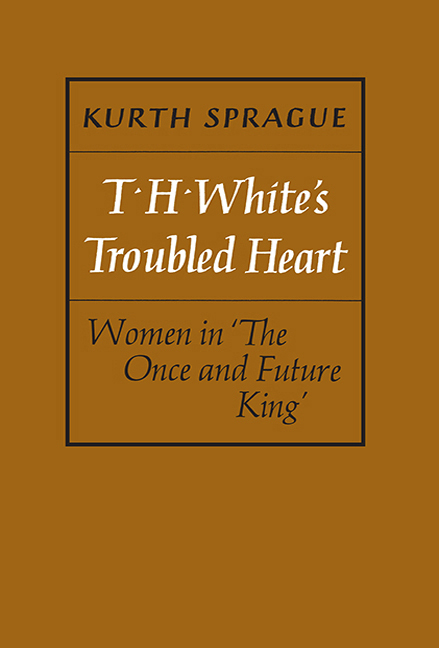Book contents
- Frontmatter
- Dedication
- Contents
- Miscellaneous Frontmatter
- Acknowledgements
- Foreword T. H. White Holdings at the Harry Ransom Center
- Preface
- Introduction
- Chapter One T.H. White
- Chapter Two Constance White
- Chapter Three White's Sources
- Chapter Four Omitted and Minor Characters
- Chapter Five Morgause
- Chapter Six Guenever
- Conclusion
- Appendixes
- Notes
- Survey of Criticism on White
- Bibliography
- Frontmatter
- Dedication
- Contents
- Miscellaneous Frontmatter
- Acknowledgements
- Foreword T. H. White Holdings at the Harry Ransom Center
- Preface
- Introduction
- Chapter One T.H. White
- Chapter Two Constance White
- Chapter Three White's Sources
- Chapter Four Omitted and Minor Characters
- Chapter Five Morgause
- Chapter Six Guenever
- Conclusion
- Appendixes
- Notes
- Survey of Criticism on White
- Bibliography
Summary
Guenever is White's only full-drawn woman in TOAFK, and the success of his achievement is made more remarkable when one considers the failure of Morgause, for example, to be more than a one-dimensional drawing etched in acid, almost a caricature. Guenever is a polychrome oil painting, not a pen-and-ink sketch.
Although Guenever appears only in the final two books of TOAFK, the reader rarely, if ever, forgets her presence in them. But it is Candle that is her book, possessing as it does some of the most poignant scenes in TOAFK between the aged lovers Guenever and Lancelot. Knight is of course Lancelot's book, not Guenever's, and when the end comes the focus of attention is on the kneeling figure of Lancelot in the center of the great field, weeping ‘as he had been a child that had been beaten.’ Guenever herself, in the stands, is almost in the wings. And yet the character of Lancelot would never have been so brilliantly determined were it not for the envisionment of Guenever: she is the force that has made him achieve his noble stature. She is a proud woman, an individual who rails at fate, and loves, and is subject to sudden, spiteful rages. She is painted round, and she is a genuine literary creation.
In the margin of his copy of Malory opposite the part of the story that tells of the death of Elaine and the arrival of the barge bearing her body to the palace, when Guenever, in a passionate reversal of form, upbraids Lancelot for not showing the dead girl more kindness while she was alive, White made the notation: ‘I have a certain angry affection for Guenever—for her spontaneity.’ Earlier in Malory, White had recognized the difficulty (which he was later in his journals to describe at length) of reconciling her contradictions. In the event, retaining his affection for her spontaneity, he did both: Guenever is full of human contradictions, and she is still a romantic heroine.
White, in an unpublished essay on Malory, which was to serve as an appendix to TOAFK, written on 8 December 1939, noted that Malory was ‘more interested in plots and ethics than in character,’ and that, while Malory was able ‘to draw [characters] with the strength of a few lightning strokes,’ White himself had, in TOAFK, ‘tediously discussed their motives.’
- Type
- Chapter
- Information
- T. H. White's Troubled HeartWomen in <I>The Once and Future King</I>, pp. 117 - 142Publisher: Boydell & BrewerPrint publication year: 2007



